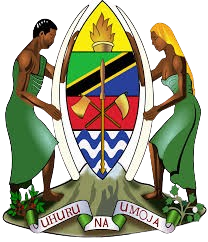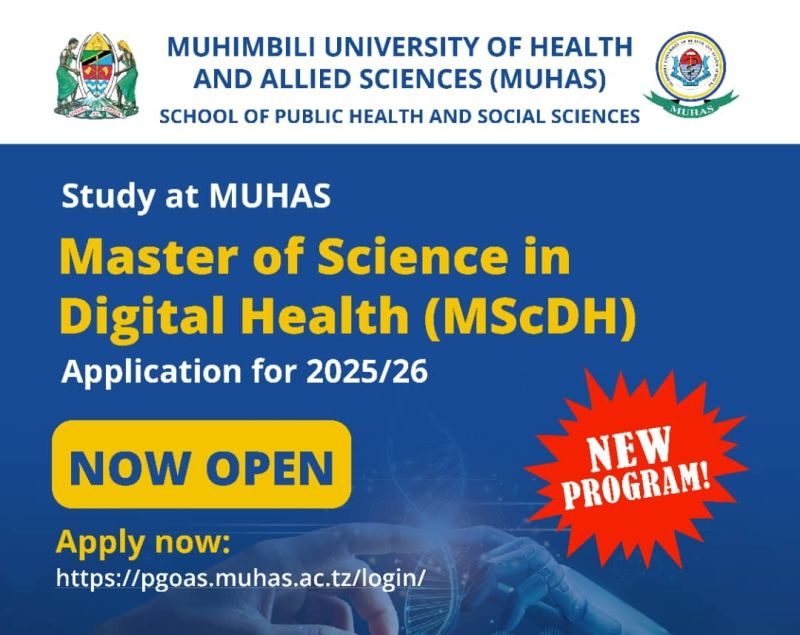In a major stride toward building a digitally empowered health workforce, Muhimbili University of Health and Allied Sciences (MUHAS) has officially launched the Master of Science in Digital Health the first program of its kind in Tanzania, and a major milestone in advancing health innovation across the African continent.
This 2-year, full-time program is housed in the School of Public Health and Social Sciences and is now open for applications via the MUHAS Postgraduate Online Application System: https://pgoas.muhas.ac.tz
Bridging Health and Technology: A Vision for Africa’s Future
As health systems across Africa face complex challenges from understaffing and infrastructure gaps to pandemic threats and chronic disease burdens digital health has emerged as a critical enabler of equitable, efficient, and resilient healthcare delivery. Recognizing this, MUHAS has taken the bold step of offering structured, specialized training in digital health, tailored to Africa’s needs and aligned with global standards.
This groundbreaking MSc program is designed to prepare a new generation of health professionals, data scientists, software engineers, and policy leaders who can design, implement, and scale digital health solutions that respond to local realities while embracing global innovation.
Who Should Apply?
The program targets passionate professionals from a wide array of disciplines, including:
-
Health sciences: Medicine, nursing, pharmacy, laboratory sciences
-
Technical fields: Computer science, IT, health informatics, engineering
-
Analytical and business backgrounds: Statistics, economics, demography, business administration
Eligibility Criteria:
-
A bachelor’s degree with a minimum GPA of 2.7
-
At least two years of work experience in the health sector
Whether you're working in government, NGOs, research institutions, or health startups, this program provides the tools to lead Africa’s digital health revolution.
A Multidisciplinary Curriculum for a Complex World
This MSc in Digital Health is structured to provide a robust foundation in public health while equipping learners with the latest technological skills. Key courses include:
-
Core Public Health Modules: Epidemiology, biostatistics, One Health, health systems leadership
-
Digital Health Foundations: Software engineering, AI/ML for health (AI4H), cybersecurity, data privacy, legal and ethical issues
-
Specialized Training: Digital health intervention design, health entrepreneurship, advanced analytics, emerging technologies
-
Hands-On Experience: Practicum, attachment in real-world digital health projects, and a dissertation focusing on innovative research or implementation work
Specialization Tracks
Students will choose from three tracks, allowing for focused expertise:
-
Digital Health Leadership – Policy, governance, health strategy, and systems change
-
Digital Health Systems Development – Design, software integration, interoperability
-
Health Data Science & AI – Big data, intelligent systems, predictive analytics in healthcare
MUHAS Digital Health Unit: Driving the Vision
The MUHAS Digital Health Unit has been the driving force behind this visionary program. The initiative reflects years of research, pilot projects, strategic collaborations, and stakeholder engagement aimed at embedding digital health in Tanzania’s health sector and beyond.
Special recognition goes to:
-
Prof. Apolinary Kamuhabwa, Vice Chancellor of MUHAS, whose leadership and unwavering commitment to academic innovation have been instrumental in the program’s approval and launch.
-
Dr. Felix Sukums, Chairperson of the MUHAS Digital Health and Innovation Alliance, who has been a vocal advocate and technical architect of this program, leveraging his vast experience in digital health systems implementation across Africa.
-
Ms. Julian Mbuke and Ms. Rebbeca Chaula, whose dedication and coordination efforts helped shape the program’s structure, stakeholder engagement, and student-centered approach.
-
The School of Public Health and Social Sciences, whose members have contributed intellectually and strategically to course design, curriculum development, and program management.
Their collective work exemplifies MUHAS’s commitment to advancing health through knowledge, research, and innovation.
Why This Matters for Africa
Digital health has the potential to dramatically improve access to quality care, reduce costs, and increase efficiency in resource-limited settings. From using AI to detect disease early, to creating integrated health records, to supporting rural clinicians via telemedicine — digital tools are no longer optional. They are essential.
Yet without a skilled workforce, even the best technology cannot fulfill its promise.
The MSc in Digital Health addresses this critical need, cultivating African talent to lead locally and compete globally. Graduates of the program will be prepared to take leadership roles in ministries of health, international agencies, NGOs, academic institutions, and digital health startups — becoming key actors in transforming how health services are delivered and managed.
Apply Now and Be Part of the Movement
This is more than just a degree — it’s a call to action. A call to shape the future of health in Africa through data, technology, and inclusive leadership.
Apply here: https://pgoas.muhas.ac.tz
Hosted at: School of Public Health and Social Sciences
Duration: 2 years full-time
#DigitalHealthAfrica #MUHAS #MScDigitalHealth #HealthInnovation #AI4Health #SmartHealthAfrica #PublicHealthLeadership #TechForGood #DataDrivenHealth #TanzaniaHealthInnovation



